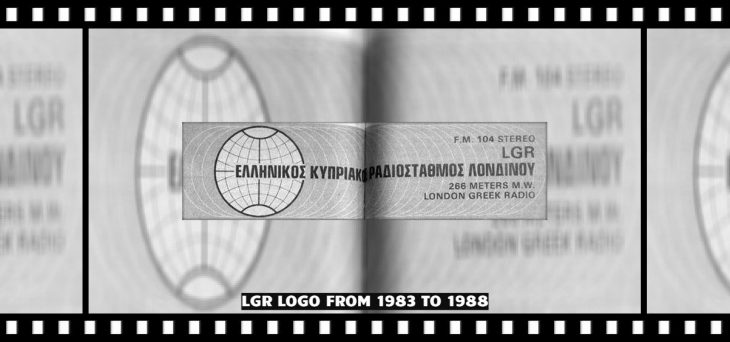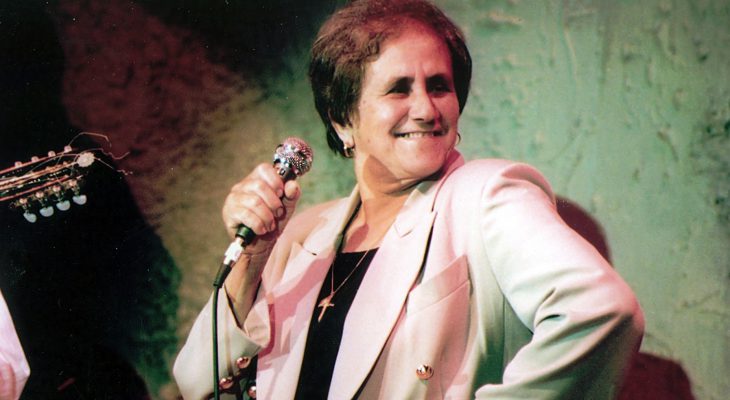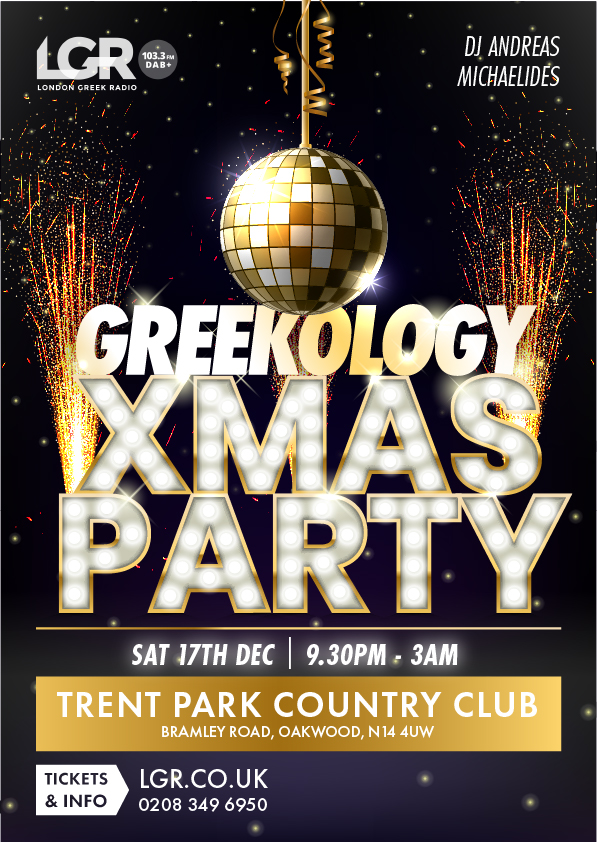LGR

LGR 103.3 FM is the official media sponsor of Josephine live in London. 🇬🇧 One of the hottest acts on the Greek music scene, Josephine will be appearing at the world-renowned Lola’s Hippodrome Casino Leicester Square, on the 28th of March. This marks her first concert in London after the success of her recent album “Ta Kala Koritsia”.🔥
Josephine has become one of the biggest female superstars in Greek music, releasing a string of consecutive hits.
Her latest album “Ta Kala Koritsia” includes hit songs such as ” Tilefono”, “Berdemata”, “Kathrefti Kathreftaki Mou”, “Poly Poly”, “Eisai Mia Thea (2023 Version)”, “Pirkaya”, “Kyma Mou” and “Geia Sou”.
Get ready for an exclusive night at The Hippodrome Casino with Josephine alongside DJ Andreas Michaelides and DJ George Michaelides plus special guests!🙌
In a whirlwind of excitement and anticipation, tickets for the much-anticipated gig have officially sold out. The announcement came from the official Greek London Live page.
LGR sponsors this Greek London Live event as London’s only official FM-licensed Greek station, and first choice for new music.
This event is sponsored by @going.greek @3wisemonkeys_assos @delphifoods @apollobakeryfinchley @apollobakerycockfosters @archway_steel
This event is supported by @andrewsshipping and KOUNNIS & PARTNERS
Official Media Sponsor: @londongreekradio
@panik_entertainment_group
#londongreekradio #lgr #lgr1033 #greekmusic #greekradio #greeksongs #newmusic #panicrecords #greeksinlondon #cypriotsinlondon #josephine #greeklondon #greeknight #events #london #lgrclubnights #greekology #athens #greece
Article written by London Greek Radio

Marina Satti, renowned Greek singer/songwriter, is set to represent Greece at the Eurovision Song Contest 2024 in Sweden at the Malmö Arena. The 36-year-old Greek artist, born and raised in Heraklion, is the daughter of a Cretan mother and a Sudanese father.
ERT bosses announced the artist on 25th October that Satti will be their next act at the 68th Eurovision Song Contest, marking the 50th anniversary of Greece’s first participant in 1974.
The song has not yet been chosen as the final song is yet to be chosen, but will be distributed by ERT and Marina’s record label, Golden Records and Minos EMI (a Universal Music Company). From 25th October, writers were invited to submit songs (in accordance with Eurovision Song Contest rules) for Satti by email with the deadline just passing on December 1st.
Satti is a singer/songwriter with roots in alternative ethnic, merging Greek, Balkan, and Middle Eastern influences. She mixes traditional and ethnic elements with pop and urban, hip-hop rhythms and electronic and is one of Greece’s most exciting artists today.
In terms of a Eurovision song Marina is favouring an ethnic modern song that is very relevant and cultural. She hinted that it will be an effective and intuitively catchy song for the Eurovision fan-base and wishes it to resonate with both young Greeks and peers of her generation.
Satti told Greek TV, “I believe a Eurovision entry should champion the culture of the country it represents” (translated). Furthermore, Satti wishes to smash through stereotypes about Greek music by illustrating Greek music can be both diverse and alternative yet still appeal to a wider audience. Her statement reveals that it will be an innovative Eurovision song with cultural and ethnic traits.
The OGAE Greece website, the official Greek fan-site for Eurovision on the selection of Marina, stated that Greece is reinventing its Eurovision identity by reverting back to the ethnic formulae of past years. Ogae said: “Greece re-defines its Eurovision identity by reverting back to its ethnicity roots and heritage.” Furthermore they stated: “On the 50th year of Greece’s Eurovision participation at the contest, the country is precipitating a change in momentum and recreating the Greek and ethnic formula which served them well in the contest for many years.” (translated).
Interestingly, Greece have always gained strong results whenever the contest was held in Malmö, particularly when sending ethnic-conscious songs: with a Top 5th and Top 6th finish for Kleopatra (1992), and Koza Mostra feat. Agathonas (2013).
Satti’s biggest hit so far in her career is undoubtedly ‘Mantissa’, a radio friendly super hit on LGR back in 2017, exceeding with over 50 million youtube hits. Other hits have included ‘Spirto ke Vinzini’ and ‘Koupes’, to name a few.
Her successful debut album, ‘YENNA’, was released in 2022. She also released the short documentary ‘FLABOURO’ as well as ‘TOCUTUM’, a song-commentary on Balkan trap, which became viral in the summer of 2023.
Satti holds a scholarship at the Berklee College of Music, with a creative and diverse background in music. She founded Fones, a female vocal group, as well as Chores, a choir of about 200 young talented women.
She also represented Greece in the EBU’s Euroradio Jazz Orchestra with works by Peter Herbolzheimer; singing at the John F. Kennedy Center, in Washington with the World Jazz Nonet; and participating in the a cappella vocal group The Singing Tribe in collaboration with Bobby McFerrin.
The Eurovision Final will take place at the Malmö Arena on Saturday 11th May with Semi-Finals on Tuesday 7th and Thursday 9th May.
London Greek Radio wish Marina Satti and Greece the very best of luck in the competition.
December 2023
Article written by London Greek Radio

The UK’s first and only 24-hour commercial Greek radio station to hold a FM license in London is celebrating 34 years of success this month, weeks after its unofficial 40th anniversary.
London Greek Radio exists to enlighten, amuse and improve the lives of our community both in the UK and abroad. In preserving our Greek and Cypriot heritage and bringing together London’s vibrant Greek community, the LGR brand is thriving by celebrating its Greek and Cypriot roots.
On 8th October 1983, LGR began transmitting to the Greek and Cypriot community as a pirate radio station and officially joined the FM airwaves on 13th November 1989. Based in North Finchley the station began its official broadcasting in November 1989. However, LGR’s origins stretch back to the early 1980s, when Akis Eracleous and Chris Harmanda launched the pirate station. It was the first-ever British station to target an ethnic minority group with its pioneering service to the Greek and Cypriot communities.
Chris Harmanda entered broadcasting to give the London Cypriot community a voice, which he and Mr Eracleous indisputably achieved.
Akis, who DJ’d under the name ‘George Power’, later became a co-founder of Kiss FM. Before this however, he and Mr Harmanda decided to launch LGR in 1983, broadcasting from Finsbury Park to North London with a Greek music format. Programmes initially came from the studio above the Quality Fish Bar in Finsbury Park, owned by the Harmanda family, and the offices in Akis’ house in N4 Grenville Road. Eventually the station spread its wings across the city, with help from friend and engineer Pyers Easton. They moved transmissions to above a Cypriot delicatessen in Muswell Hill, where LGR’s tall aerial mast took it’s programmes to the whole of the North London area. Even in the early days of its arrival on the airwaves, LGR gathered a dedicated following very quickly.
In 2018 we tragically lost both Akis and Chris, but they left with us their incredible legacies. The perseverance and bravery of these men, who scaled the rooftops of sites, ensuring each morning we all awoke to the sound of LGR, can never be forgotten. At the Haringey office, there was an iconic image that proudly hung of its founders and DJ ‘Kokis’ putting up the FM aerial for the pirate station on a rooftop.
The staff and volunteers endured great adversity and went to great lengths during the 1980’s to keep London Greek Radio on the air.
“Growing up in North London in the 90s, the whole family was listening”. Ask a Greek or Cypriot and this is what they will tell you. LGR’s real timeless traits, which helped trigger a sense of nostalgia and a connection to their culture. This is where LGR plays to its strengths and is the reason why London-born Greeks and Cypriots come back to it. This is the modern legacy of London Greek Radio.
LGR presenter Tony Neophytou mentions that “the Greek speaking community have a penchant for radio because of the strength of their attachment to back home. Whether they come from Cyprus, Greece or the Diaspora, anything that recreates a sense of their roots stirs them emotionally. That’s partly due to the music of course, with its lyric content, but it’s also about the culturally relevant topics we talk about.”
For Mr Neophytou, “family and community” is what comes to mind when thinking about LGR. For many London Greeks and Cypriots, the station has provided “a safe space” to go to, affirming roots and heritage and comforting its listeners 24/7. It’s a ‘safe and secure space’ of a trusted-family member, he describes.
In the mid-1980s, tens of thousands of people signed a petition demonstrating the need for LGR to have a real presence within the community. The signatures were handed to the relevant authorities which subsequently contributed to the station being licensed by the radio authorities.
A number of fundraisers with community artists and DJs, i.e. at the Camden Electric Ballroom had thousands come out in support of the beleaguered illegal pirate station. It took a great deal of documentary evidence, correspondence, press campaigns, and petitions to eventually convince the radio authorities that LGR should be granted a licence.
The pirate LGR left the air at the end of 1988 having decided to apply for one of the new incremental radio licenses. They decided to work together with Afro-Carribean station WNK to share a frequency, winning the North London license with a 12-hour daily allowance.
LGR returned to the air legally as London’s first Greek community radio station in November 1989.
The book, ‘London’s Pirate Pioneers‘ (2015) by Stephen Hebditch tells the story of the capital’s pirate radio stations and the people who helped change the British broadcasting system. He writes about LGR’s undeniable legacy in the eighties and the intense pressures it faced to shut down.
However, London Greek Radio became one of Britain’s first-ever licensed ethnic radio stations upon being awarded its license.
On November 13th 1989, LGR opened its doors as a fully legal station, with offices and a studio located on Vale Road, Haringey. In 2003, LGR purchased a freehold in Finchley and moved to its current studios at the LGR House.
One of London’s first-ever licensed ethnic radio stations began official broadcasting on 13th November 1989 upon being awarded its license, breaking ground in changing the landscape of UK radio.
John Kyriakides, Chairman of London Greek Radio, described the twists and turns in the station’s turbulent history.
“It was a difficult and protracted journey. George Eracleous and Chris Harmanda, two young men who intended to launch a Greek-language pirate radio station in the early 1980s, are credited with founding the station. Eventually, the station became a target for the authorities, who prosecuted the founders and repeatedly threatened to arrest them. Though we had to share the frequency with an Afro-Caribbean channel, Eracleous and Harmanda never gave up, and with the help of the Greek and Cypriot communities, a few directors, and myself, the radio station was given a licence at the end of the decade.
“We were only permitted to broadcast for twelve hours at first, however after five years, the Afro-Caribbean station disbanded, and London Greek Radio was then granted a 24-hour radio licence and became an independent radio station.”
Over the years, LGR 103.3 FM has become steadfast to a wide range of listeners; from maturing-settlers-to-the-UK to the coming-of-age London Greek-speakers – connecting listeners to their roots through a carefully balanced programming of music, speech, entertainment and news.
The LGR DJs who went on-air during the Covid pandemic, felt the responsibility to be not only informative but be a form of escapism. Its enduring qualities during the tough times is a testament to the powerful connection it holds within the community.
It also serves advertising for many Greek and Cypriot run businesses in and around North London. LGR has recently increased its English language airtime encouraging more Greek-speaking young people to listen in, particularly during the daytime, drive time and evenings as part of the schedule. LGR is also recruiting younger presenters, who combine Greek music with discussions on everything from cultural identities to chart trends.
The station is an integrated part of the communities’ social lives, including the organised Greekology events. Mr Eracleous suggested launching LGR nights at a local club, which helped to boost the credibility and impact of the station. In 2012, its debut at the Marquee Club with most notably, Cypriot Eurovision star Ivi Adamou, was sold-out with over 500 people in attendance. LGR Club Nights are currently the station’s biggest event, with more than a few dates in London taking place each year.
Today it is the go-to station for the championing of up-and-coming Greek/Cypriot music talents and recently launched its own LGR Productions. It has provided a platform for young music talents, while welcoming big-name guests such as Konstantinos Argiros, Stan, Nikos Vertis, Helena Paparizou, Giannis Ploutarhos and Michalis Hatzigiannis. The attendance of music stars in recent years sprinkled some stardust at the LGR studios.
LGR has supported charities including Radiomarathon, London Autism Group Charity, UK Thalassaemia Society and Alkionides UK Charity. The Leukaemia Cancer Society even gives the credit to LGR in inspiring the creation of the cancer charity. The charity’s website acknowledges this fact.
“In 1994 London Greek Radio (LGR) put out a mother’s appeal for her son. Flushed with success the group decided to carry on recruiting new donors, raising awareness of blood cancers, and supporting patients with the disease. Within a year of hearing the appeal on London Greek Radio, the group had formed a committee and registered the charity.”
The station gives a voice to charity fundraising initiatives with its scheduling of specialist shows. LGR recently organised National Thalassaemia Day in partnership with #UKTS and its patrons, raising awareness of an issue which affects many Cypriots today.
LGR is a commercial station and survives on the income generated from its loyal and valued customers and whilst this is the case, it offers a free service to local charity and community interests.
The LGR brand is alive and thriving to this very day. In addition to serving the Greek and Cypriot communities on air, LGR has broken into 21st-century broadcasting by joining the Digital Radio platform.
LGR can now be heard in two major cities on DAB+ (digital radio), namely London and Birmingham.
Furthermore, listeners extend worldwide at lgr.co.uk and the station has a free app for mobile devices which listeners can download from the App or Play stores embracing the ‘on-the-move’ audience.
The audience base of LGR, which includes listeners from the Italian, Spanish, Arab, Jewish, Armenian, Bulgarian, and Turkish Cypriot communities, is well-established and diverse.
LGR’s Managing Director, Tony Jay, said, “More listeners are discovering the ever-growing London Greek Radio family every day, not only Greek-speaking listeners but English, Jewish, Albanian, Arab, Bulgarian, Turkish, Russian and many more that frequently tune in.
He added, “LGR is undergoing a revamp with fresh ideas to attract an even wider audience. Exciting times ahead ‘onwards and upwards’.”
LGR’s Chairman John Kyriakides, added, “With LGR’s edgier playlists of the biggest Greek and Cypriot tunes, Modern Laika, Greek Pop, Entehna, Golden-Oldies, Alternative, Folk and Current Chart Hits, we continue to serve the listener. It’s this enigmatic reason that the station remains the preferred choice in most Greek and Cypriot homes, offices, shops, factories, workplaces, vehicles and venues.
In conclusion, he states that “our multilingual programmes–English and Greek–reach a large and diverse audience on a global scale. It broadcasts music, interviews, announcements, community events, local news, Greek and Cypriot news in addition to church services. While catering to the lively lifestyle of one of London’s prosperous communities, the wide range of programmes are made to appeal to all age groups.”
Article written by London Greek Radio

LGR first joined the airwaves as a pirate in October 1983, it became licensed in November 1989 and in May 1994 LGR’s license was renewed and extended to broadcast 24 hours a day seven days a week to the greater area of the capital from its North London studios.
Akis Eracleous and Chris Harmanda launched LGR on 8th October 1983, the first Greek pirate radio station in London. The first-ever British station to target ethnic minorities with its pioneering service to the culturally diverse Greek and Cypriot communities.
Chris Harmanda entered broadcasting to give the London Cypriot community a voice, which he and Mr Eracleous indisputably achieved.
This month, LGR celebrates its 40th unofficial birthday. Now it is a legal service and the first 24-hour independent Greek radio station to hold the FM frequency license in London.
Akis, who DJ’d under the name ‘George Power’, was a co-founder of Kiss FM later. In 1983, he and Mr Harmanda decided to launch LGR broadcasting from Finsbury Park to North London with a Greek music format. Programmes initially came from the studio above the Quality Fish Bar in Finsbury Park, owned by the Harmanda family, and the offices in Akis’ house in N4 Grenville Road. Eventually the station spread its wings across the city, with help from friend and engineer Pyers Easton. They moved transmissions to above a Cypriot delicatessen in Muswell Hill, where LGR’s tall aerial mast took it’s programmes to the whole of the North London area. Even in the early days of its arrival on the airwaves, LGR gathered a dedicated following very quickly.
However, sadly in 2018 we lost both men, leaving behind their incredible legacies. The perseverance and bravery of the men who scaled rooftops of sites, ensuring the next morning we all awoke to LGR. At the Haringey office, there was an iconic image that proudly hung of its founders and DJ Kokis putting up the FM aerial for the pirate station on a rooftop. The staff and volunteers endured great adversity and went to great lengths during the 1980’s to keep London Greek Radio on the air.
Akis Eracleous hosted the very first show of the unlicensed station. He and George Gregoriou, known by his nickname Kokis and Aliki Michael, graced the airwaves. Kokis, LGR’s longest-serving DJ recounted: “I was collecting Greek records because I was learning the bouzouki. I’d go up the Greek Lanes and buy 45s.”
When the station began, LGR called rag trade factories with big Cypriot workforces. “We said: ‘Put it on you’ll hear Greek music to work by“, says Kokis. “Factory to factory, the station became known by word of mouth.”
LGR quickly soared in listening numbers and was not long after was followed by a flood of competitors i.e. GCR, Foni ton Apodimon, Foni tis Parikias, Londino ’88 and others. Despite its rivals, LGR’s reputation as the original Greek-Cypriot broadcaster garnered the kind of loyalty which out-performed its rivals. By 1987 85% of Cypriots were tuning into the unlicensed station every week.
“Growing up in North London in the 80s & 90s, the whole family was listening“. Ask a Greek or Cypriot and this is what they will tell you. LGR’s real timeless traits, which helped trigger a sense of nostalgia and a connection to their culture. This is where LGR plays to its strengths and is the reason why London-born Greeks and Cypriots come back to it. This is the modern legacy of London Greek Radio.
LGR presenter Tony Neophytou mentions that “the Greek speaking community have a penchant for radio because of the strength of their attachment to back home. Whether they come from Cyprus, Greece or the Diaspora, anything that recreates a sense of their roots stirs them emotionally. That’s partly due to the music of course, with its lyric content, but it’s also about the culturally relevant topics we talk about.”
In the mid-1980s, tens of thousands of people signed a petition demonstrating the need for LGR to have a real presence within the community. The signatures were handed to the relevant authorities which subsequently contributed to the station being licensed by the radio authorities.
The pirate LGR left the air at the end of 1988 having decided to apply for one of the new incremental radio licenses. They decided to work together with Afro-Carribean station WNK to share a frequency, winning the North London license with a 12-hour daily allowance. LGR returned to the air legally as London’s first Greek community radio station in November 1989.
The book, ‘London’s Pirate Pioneers‘ (2015) by Stephen Hebditch tells the story of the capital’s pirate radio stations and the people who helped change the British broadcasting system.
He writes about LGR’s undeniable legacy in the eighties and the intense pressures it faced to shut down. As quoted:
“The biggest action ever taken by the authorities against LGR came in 1988 when the police raided LGR’s offices, yet again, only this time they confiscated all paperwork related to the station. In a case at Highgate Magistrates Court in July, companies and staff associated with London Greek Radio were fined £13,900 plus £10,550 in costs and expenses.”
Thousands of listeners to LGR had come out in support of the beleaguered illegal pirate station, at a Camden event. “We were faced with closure, so we held a LGR night at the Electric Ballroom in Camden Town,” says George (‘Kokis’). “It sold out twice over and we did it again the following week for those who had missed out.”
LGR even stirred some Parliament airtime, responding to a question by a certain Jeremy Corbyn, Labour MP, that asked the Chancellor of the Duchy of Lancaster Mr Atkins how many times his Department has confiscated equipment held by LGR.
My department’s radio investigation service has seized equipment being illegally used by London Greek Radio on 151 occasions. The equipment when seized is held in a secure store and disposed of in accordance with section 83 of the Telecommunications Act 1984. (Hansard archive, 10th January 1989).
However, London Greek Radio became one of Britain’s first-ever licensed ethnic radio stations upon being awarded its license.
On November 13th, 1989, LGR opened its doors as a fully legal station, with offices and a studio located on Vale Road, Haringey. In 2003, LGR purchased a freehold in Finchley and moved to its current studios in LGR House.
One of London’s first-ever licensed ethnic radio stations began official broadcasting on 13th November 1989 upon being awarded its license, breaking ground in changing the landscape of UK radio.
John Kyriakides, Chairman of London Greek Radio, described the twists and turns in the station’s turbulent history.
“It was a difficult and protracted journey. George Eracleous and Chris Harmanda, two young men who intended to launch a Greek-language pirate radio station in the early 1980s, are credited with founding the station. Eventually, the station became a target for the authorities, who prosecuted the founders and repeatedly threatened to arrest them. Though we had to share the frequency with an Afro-Caribbean channel, Eracleous and Harmanda never gave up, and with the help of the Greek and Cypriot communities, a few directors, and myself, the radio station was given a licence at the end of the decade.
“We were only permitted to broadcast for twelve hours at first, however after five years, the Afro-Caribbean station disbanded, and London Greek Radio was then granted a 24-hour radio licence and became an independent radio station.”
LGR 103.3 FM, celebrates 34 years of broadcasting as a radio station on 13th November 1989, becoming the UK’s longest-serving ethnic station to hold an FM license.
Over the years, London Greek Radio has become steadfast to a wide range of listeners; from maturing-settlers-to-the-UK to the coming-of-age London Greek-speakers – connecting listeners to their roots through a carefully balanced programming of music, speech, entertainment and news.
It serves advertising for many Greek and Cypriot run businesses in and around North London. LGR has recently increased its English language airtime encouraging more Greek-speaking young people to listen in, particularly during the daytime, drive time and evenings as part of the schedule. LGR is also recruiting younger presenters, who combine Greek music with discussions on everything from cultural identities to chart trends.
Over the years, LGR 103.3 FM has been known for its diverse musical offerings, covering a wide range of genres, including classic and modern laika, pop-laika, entehno, elafrolaiko, and many more. It also features a mix of music news, celebrity interviews, community chest shows and cultural content designed to appeal to its demographic.
The station is an integrated part of the communities’ social lives, including the organised Greekology events. Mr Eracleous suggested launching LGR nights at a local club, which helped to boost the credibility and impact of the station. In 2012, its debut at the Marquee Club with most notably, Cypriot Eurovision star Ivi Adamou, was sold-out with over 500 people in attendance. LGR Club Nights are currently the station’s biggest event, with more than a few dates in London taking place each year.
LGR played a huge part in radio history, by giving Greek and Cypriot musicians the chance to discover a space for themselves in the music scene. Today it is the go-to station for the exploration of up-and-coming artists and homegrown talent and recently launched its own LGR Productions.
LGR has supported charities including Radiomarathon, London Autism Group Charity, UK Thalassaemia Society and Alkionides UK Charity. The Leukaemia Cancer Society even gives the credit to LGR in inspiring the creation of the cancer charity. The charity’s website acknowledges this fact.
“In 1994 London Greek Radio (LGR) put out a mother’s appeal for her son. Flushed with success the group decided to carry on recruiting new donors, raising awareness of blood cancers, and supporting patients with the disease. Within a year of hearing the appeal on London Greek Radio, the group had formed a committee and registered the charity.”
The LGR brand is still alive and well today. Today, in addition to serving communities on 103.3FM, LGR has been taken into 21st-century broadcasting by joining the Digital Radio platform.
LGR can now be heard in two major cities on DAB+ (digital radio), namely London and Birmingham.
Furthermore, listeners extend worldwide at lgr.co.uk and the station has a free app for mobile devices which listeners can download from the App or Play stores embracing the ‘on-the-move’ audience.
The audience base of LGR, which includes listeners from the Italian, Spanish, Arab, Jewish, Armenian, Bulgarian, and Turkish Cypriot communities, is well-established and diverse.
LGR’s Managing Director, Tony Jay, said, “More listeners are discovering the ever-growing London Greek Radio family every day, not only Greek-speaking listeners but English, Jewish, Albanian, Arab, Bulgarian, Turkish, Russian and many more that frequently tune in.
He added, “LGR is undergoing a revamp with fresh ideas to attract an even wider audience. Exciting times ahead ‘onwards and upwards’.”
LGR’s Chairman John Kyriakides, added, “With LGR’s edgier playlists of the biggest Greek and Cypriot tunes, Modern Laika, Greek Pop, Entehna, Golden-Oldies, Alternative, Folk and Current Chart Hits, we continue to serve the listener. It’s this enigmatic reason that the station remains the preferred choice in most Greek and Cypriot homes, offices, shops, factories, workplaces, vehicles and venues.
In conclusion, he states that “our multilingual programmes–English and Greek–reach a large and diverse audience on a global scale. It broadcasts music, interviews, announcements, community events, local news, Greek and Cypriot news in addition to church services. While catering to the lively lifestyle of one of London’s prosperous communities, the wide range of programmes are made to appeal to all age groups.”
October 2023
Article written by London Greek Radio

Greek Cypriot artist Georgia George is set to release some irresistible summer vibes with her new single ‘Tsifteteli Zeimbekika‘ on July 28th.
This infectious anthem transports listeners to vibrant bouzoukia nights. Georgia’s exceptional vocals and dynamic songwriting skills bring life and love to the forefront, captivating audiences across Greece, Cyprus, England, and beyond. Inspired by the bustling London bouzoukia nightclub scene and fuelled by her passion for Greek music, Georgia collaborates with her brother Vasilis, a talented lyricist, to create catchy lyrics. Having been immersed in Greek melodies from a young age, Georgia is thrilled to ignite the UK Greek community with her irresistible summer dance anthem.
“I’m excited to bring some Greek summer vibes to audiences across the UK Greek community with my new song ‘Tsifteteli Zeimbekika.’ It’s a catchy, upbeat summer dance anthem that will get everyone on their feet!”
Georgia, a singer-songwriter and producer from Devon told London Greek Radio: “As a fan of LGR, I believe that my song would be a great fit for your listeners. ‘Tsifteteli Zeimbekika’ is an upbeat and catchy tune that combines elements of traditional Greek music with modern pop, showcasing my unique sound.”
You can follow Georgia George on all social media platforms @georgiageorgemusic
Growing up with London Greek Radio, since 1989
Published: July 2023
Article written by London Greek Radio

It is with a heavy heart that LGR announces the tremendous loss and passing of our long-time friend and colleague, Vassoula Vronti Orchard.
She passed away peacefully on Sunday 7th May 2023 after a courageous battle with Anaplastic Thyroid Cancer. She was 68.
Vassoula was a long-serving LGR employee, since it was first founded over thirty-five years ago. She has been serving the Greek Cypriot community, through her dedication to her work at LGR ever since.
Vassoula was born in Trikomo in 1954, and attended the American Academy after moving to Larnaca before arriving in the West end of London and embracing the bright lights of City Life, whilst always honouring her heritage and traditional values.
Vassoula was one in a million. A vibrant, warm, kind and thoughtful soul who was always on hand to help her colleagues, friends and loved ones, to the best of her ability. She was a consummate professional, an asset to the community and was simply irreplaceable.
Her generosity knew no bounds and there will be a huge void in the hearts and lives of everyone who had the pleasure of knowing her, working with her and loving her.
Vassoula is survived by her husband Clive, her two daughters Maria and Alexia, grandsons Tate and Miles who she absolutely adored and doted on, and son-in-law Chris, sister Demetra and brother-in-law Costakis, brother Panicos and sister-in-law Yioulla, her nieces and nephews and their families, her grandchildren, extended family and friends.
The funeral will take place on Wednesday 24th May at 11.00am at St. Panteleimon Church, 660 Kenton Road, Harrow, HA3 9QN, followed by a burial at Pinner New Cemetary, 660 Pinner Road, Pinner, HA5 5RH at 1pm.
The wake will be held at St. Panteleimon Church Hall after the funeral.
Flowers are welcome and can be sent to Demetriou & English, 131-133 Myddleton Road, London N22 8NG. There will also be an option for those wishing to donate to The Royal Marsden Cancer Charity in Vassoula’s memory via a Web link / Charity box on the day.
There will also be a memorial book at the hall for people to share their thoughts and memories, if they wish to, in remembrance of a beautiful woman whose light will shine on in the hearts of all who were lucky enough to know her.
Everyone at LGR extend their condolences to the family, and we thank her for her services to our community and to London Greek Radio.
Memory eternal, Vassoula. You will be missed.
Article written by London Greek Radio

The “voice of the Cypriot countryside”, traditional singer Kyriakou Pelagia died on Saturday at the age of 86, her relatives announced on social media.
Known as Mastorissa, as her colleagues called her for her unique interpretation of Cypriot folk songs, Pelagia had given another dimension to the genre bringing youth closer to folk music.
Government officials, political parties as well as the general public expressed their condolences to the family while praising the Cypriot singer’s voice and character.
“Kyriakou Pelagia was the voice of tradition,” the office of the president-elect Nikos Christodoulides said in a statement.
“[She] was loved by the world like few other traditional singers because of her unique voice, her special interpretation, spontaneity, simplicity and ethics, inspiring and paving the way for younger performers to become involved in traditional Cypriot singing,” the statement added.
In his own tweet, the outgoing president Nicos Anastasiades said Pelagia’s death is a “great loss for the culture of our country”.
“With her voice and the Cypriot folk song, she succeeded in teaching the Cypriot culture to our young people,” he added.
“The Cypriot tradition is poorer as of today,” the Green Party said earlier in the day.
Traditional song performer Michalis Hadjimichael also shared a small farewell poem on Facebook for his former collaborator, highlighting the great loss in the music world.
Born in Paralimni on July 8, 1936, Pelagia was the daughter of the traditional singer Damianos Kouzalis and Maria Koutsoluka who had an appreciation of traditional songs.
The singer is known for her major hits Ipa sou htenistou lion and Pertidji mou mitsostomo, the result of her collaboration with Hadjimichael in his musical group Mesogios.
Pelagia was excellent both in singing but also tsatisma and poetry. In 1987 she published the poetry collection Cypriot Verse.
Her funeral was held at the Ayios Georgios church in Paralimni, presided by Bishop Vasilios of Constantia and Famagusta after people were allowed to pay their respects earlier on Sunday afternoon.
Before the start of the funeral procession, musicians sang the traditional Cypriot song “Ta Niata”. The eulogy was delivered on behalf of the family by her granddaughter, Solia Pelagia, Deputy Minister of Culture Yiannis
Toumazis on behalf of the President of the Republic, the Mayor of Paralimni Theodoros Pyrillis and Michalis Hadjimichael on behalf of the artists’ community.
Also attending were transport minister Yiannis Karousos, Disy leader Averof Neophytou and other officials.
Referring to her grandmother, Solia Pelagia said: “You kept talking to us about your two great loves. One was the house in Varosha. You left my grandmother with the sorrow of not returning to your home. Your other great love, which you talked to us about constantly, was tradition. You loved music very much. You made us proud and with your melodious voice you left us your songs, a huge cultural heritage. You were loved by many people.”
Toumazis described the singer as “a genuine traditional performer” and “the voice of the Cypriot countryside”.
“Kyriakou Pelagia belongs to the category of people who make use of the natural gifts with which they are endowed, but also what they managed to develop during their lives for the benefit of society,” he added.
The procession from the church to the local cemetery in Paralimni was accompanied by violins and lutes. The funeral costs were borne by the municipality to honour the late singer.
She had two sons and a daughter with her husband Georgios.
LGR express their condolences to Kyriakou Pelagia’s family and friends.
Article written by Jean Christou, Gina Agapiou, Cyprus Mail, London Greek Radio

The seven acts in the running to represent Greece at the Eurovision Song Contest 2023 have been revealed.
The acts were shortlisted from 106 entries received by ERT following a request for submissions last year.
The winner will be chosen by a combination of jury panel and audience vote.
The voting is split into (i) a 7-persons jury panel, and (ii), a 70-person ‘Audience Committee’.
2,982 fanatic fans have responded to sit as “audience”, places were allocated through a random draw. The lucky 70 individuals were placed into ‘focus groups’ strictly according to age demographics. Its share of the vote is 50.6%, while jurists, other 49.4%. The “audience” have spoken and cast their verdict at a voting session held last month, in Athens.
Greek bosses are teasing fans about its Eurovision 2024 plans, meanwhile. ERT’s president Konstantinos Zoulas, speaking in December said, “we are planning something more, than a national final or ethnikos telikos, (translated)” for next year.
Take a look at the contenders below.
Antonia Kaouri & Maria Maragkou – “Shout Out!”
Konstantina Iosifidou – “We are Young”
Klavdia – “Holy Water”
Leon of Athens – “Somewhere to Go”
Melissa Mantzoukis – “Liar”
Monika – “I’ m Proud”
Victor Vernicos – “What They Say”
Updated: 19/01/2023 (Top 3 finalists)
Antonia Kaouri & Maria Maragkou, Melissa Mantzoukis, Victor Vernicos
Antonia Kaouri and Maria Maragkou’s entry is an English-language ‘up-tempo pop-rock’ song. Antonia is a former Voice of Greece act and Maria, a Greek actress.
Konstantina Iosifidou is a 22-year-old, former contestant on The Voice of Greece. “We Are Young” is an English-language ‘rock-pop ballad’.
Klavdia, is a newcomer artist and a former contestant, on The Voice of Greece. “Holy Water” is a ‘slow, melodic ballad’, with a social-conscience lyric. She’s working with Arcade, a team of music producers, who as co-writers of Greece’s entry in 2021, have Eurovision pedigree, too.
Leon of Athens is a recording artist and songwriter. The entry here is ‘up-tempo’ 80’s synth pop. He worked on the final version of this song, with singer and songwriter David Sneddon, who he co-wrote “Better Love” (Greece, 2019), with too. He co-writes it with Katerine Duska. Their latest single/duet “Babel” is a radio-friendly hit, on LGR.
Melissa Mantzoukis, 18-year-old German-Greek singer, she was a finalist on the “Deutschland sucht den Superstar” the German equivalent to Pop Idol. It is a mainstream song, which is ‘up-tempo pop-dance’ about female empowerment. The songwriters from Greece and the Netherlands.
Monika – real name Monica Christodoulou, is a singer-songwriter . Monika wrote the original soundtrack to “The Lost Daughter” recently, which means she is causing waves on the world-stage, too. “I’m Proud”, is ‘melodic’ and ‘mid-tempo’.
Victor Vernicos is a part-Danish/Greek singer-songwriter. The song is a ‘mid-tempo ballad’ and ’emotional’, about human stress and anxiety. Victor’s unique vocal timbre may be an asset, too. At just 16-years-old, Victor shows a lot of maturity.
Greek bosses will meet with artists and representatives from their record labels to assess their plans, before finalising their scores. As in recent years, the record label’s plans for Eurovision have been an important part of the final decision.
The Eurovision semi-finals are airing on 9th and 11th May and the grand final is on May 13th at Liverpool Arena.
Published: 22/01/2023
Article written by London Greek Radio

London Greek Radio Top 40 Songs.
The definitive Chart rundown this November 2022.
This month’s biggest, most in demand hit songs.
1 Konstantinos Argiros – Afou Se Vrika De S’ Afino
2 Giorgos Kakosaios – Kane Mas Tin Hari
3 Nikos Vertis – Zise
4 Ilias Vrettos – Os To Apeiro
5 Konstantinos Argiros feat. Light – Iliovasilema
6 Dimos Anastasiades – S’ Agapao Akoma
7 Katy Garbi feat. Thodoris Ferris – Ola Sta Katalogizo
8 Panos Kiamos – Tha Me Zitas (Tha Apousiazo)
9 Giorgos Mazonakis feat. Arash – Tora Tora (Boro Boro)
10 Nikos Oikonomopoulos – Prepi Den Prepi [NEW]
11 Giorgos Papadopoulos & Elkana Marziano – Katalaveno (Katn Alenu)
12 Natasa Theodoridou – Perifania Mono [NEW]
13 Petros Iakovidis – Esena Mono
14 Konstantinos Argiros – Eleftheros
15 Anastasia – Ligo Ligo
16 Elli Kokkinou – Gia Fantasou [NEW]
17 Eleni Foureira x Dj Bobito (Ft. Ayman) – El Telephone
18 Anna Vissi feat. Daphne Lawrence – Aima
19 Aspa – Ela
20 Nikos Makropoulos – O Vardaris Stin Athina [NEW]
21 Ivi Adamou – Rikse Mou
22 Panos Kiamos x Oge – De Se Vlepo (Apopse Vazo Terma) [NEW]
23 Josephine – Pirkaya
24 Josephine – Kyma Mou
25 Petros Iakovidis – Odos Tsimiski
26 Christos Mastoras – Ego Gia Dyo (20 Hronia Eleana Vrachali, Paidi Diko Sou)
27 Katerina Liolou – Mi Rotas Tous Allous
28 Nikos Apergis & Malu – Poso Poso
29 Anastasia – Amarties
30 Helena Paparizou x Marseaux x Joanne – Katse Kala (Arcade Remake)
31 Ilias Vrettos – Se Kapio Minima [NEW]
32 Nikiforos – Pes Mou Pou Tha Me Pas
33 Panos Kalidis – Ego Eimai Aftos [NEW]
34 Giorgos Sabanis – Poios Ticheros
35 Triantafyllos – Se Pairno Gia Na Sou Po
36 Giorgos Giannias – Pes Mou Pou Girnas [NEW]
37 Michalis Hatzigiannis – Esi Ise Pano Ap’ Ola
38 Morfoula – Esena Mono
39 Nafsika – Misi Kardia
40 Panos Psaltis – Tha Vreis Pollous
103.3 FM London
DAB+ Birmingham, London, Manchester
website: lgr.co.uk
London Greek Radio Mobile App (free to download)
On Smart Speakers, ‘Play London Greek Radio’
LGR, the radio station you can trust, since 1989.
Article written by London Greek Radio

LGR Club Nights returns on Saturday the 17th of December for a Christmas Special at the Country Club Trent Park.
We are hosting a spectacular Christmas party on Saturday 17th December featuring DJ Andreas Michaelides mixing Greek & English hits, including the best Modern Laika, Greek Club, Greek Classics and Zeimbekika alongside all the biggest LGR hits of the decade.
As always, there will also be surprise guests live in-person at The Country Club from 9:30pm ’til late on what’s expected to be a real Christmas extravaganza!
And we now announce that special guests on the night include Mixalis Theodosiou with live band and Eleni C with dancers!
If you’re really quick, there’s some reduced limited early-bird tickets, which are available whilst stocks last!
So make sure you’ve got your ticket secured today (via) the link here.
This is a strictly over-18’s night and physical photo ID will be required for entry. Unfortunately, only physical proof of over-18 ID will be accepted.
LGR’s Christmas Greekology Club Night at The Country Club, Trent Park N14 on Saturday 17th December.
LGR, the radio station you can trust, since 1989.

Article written by London Greek Radio


